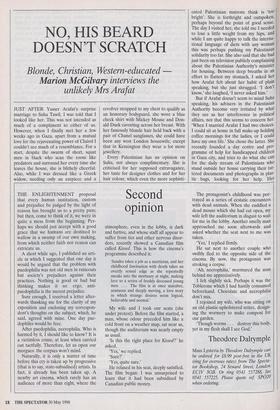Second opinion
THE ENLIGHTENMENT proposal that every human institution, custom and prejudice be judged by the light of reason has brought us to a pretty pass; but then, come to think of it, we were in quite a mess from the beginning. Per- haps we should just accept with a good grace that we humans are destined to wallow in a swamp of our own making, from which neither faith nor reason can extricate us.
A short while ago, I published an arti- cle in which I suggested that one day it would be argued that the problem with paedophilia was not old men in raincoats but society's prejudices against their practices. Nothing is good or bad but thinking makes it so: ergo, anti- paedophilia is the merest prejudice.
Sure enough, I received a letter after- wards thanking me for the clarity of my exposition and enclosing my correspon- dent's thoughts on the subject, which, he said, agreed with mine. One day pae- dophiles would be free.
After paedophilia, necrophilia. Who is harmed by it, I should like to know? It is a victimless crime, at least when carried out tactfully. Therefore, let us open our morgues: the corpses won't mind.
Naturally, it is only a matter of time before this cry is taken up by progressive (that is to say, state-subsidised) artists. In fact, it already has been taken up. A nearby art cinema, which rarely has an audience of more than eight, where the atmosphere, even in the lobby, is dark and furtive, and whose staff all appear to suffer from tics and other nervous disor- ders, recently showed a Canadian film called Kissed. This is how the cinema's programme described it:
'Sandra takes a job as a mortician, and her childhood fascination with death takes an overtly sexual edge as she repeatedly sneaks into the mortuary at night, making love to a series of freshly deceased young men ... The film is at once macabre, sensuous and deeply moving, a love story in which strange desires seem logical, believable and normal.'
My wife and I took our seats (she under protest). Before the film started, a man, whose odour preceded him like a cold front on a weather map, sat near us, though the auditorium was nearly empty as usual.
`Is this the right place for Kissed?' he asked.
`Yes,' we replied.
`Sure?'
`Yes, quite sure.'
He relaxed in his seat, deeply satisfied. The film began: I was unsurprised to learn that it had been subsidised by Canadian public money. The protagonist's childhood was por- trayed as a series of ecstatic encounters with dead animals. When she cuddled a dead mouse which she had cut open, my wife left the auditorium in disgust to wait for me in the lobby. Another smelly man approached me soon afterwards and asked whether the seat next to me was taken.
`Yes,' I replied firmly.
He sat next to another couple who swiftly fled to the opposite side of the cinema. By now, the protagonist was stroking a corpse.
`Ah, necrophilia,' murmured the man behind me appreciatively.
I felt slightly sick. Perhaps it was the Toblerone which I had hastily consumed beforehand. Chocolate and necrophilia don't mix.
I rejoined my wife, who was sitting on an old plastic-upholstered settee, design- ing the wormery to make compost for our garden.
`Though worms . . . destroy this body, yet in my flesh shall I see God.'
Theodore Dalrymple
Mass Lysteria by Theodore Dalrymple can be ordered for £8.99 post-free in the UK (ring for overseas rates) from The Specta- tor Bookshop, 24 Seward Street, London EC1V 3GB. Or ring 0541 557288, fax 0541 557225. Please quote ref SP020 when ordering.


































































 Previous page
Previous page